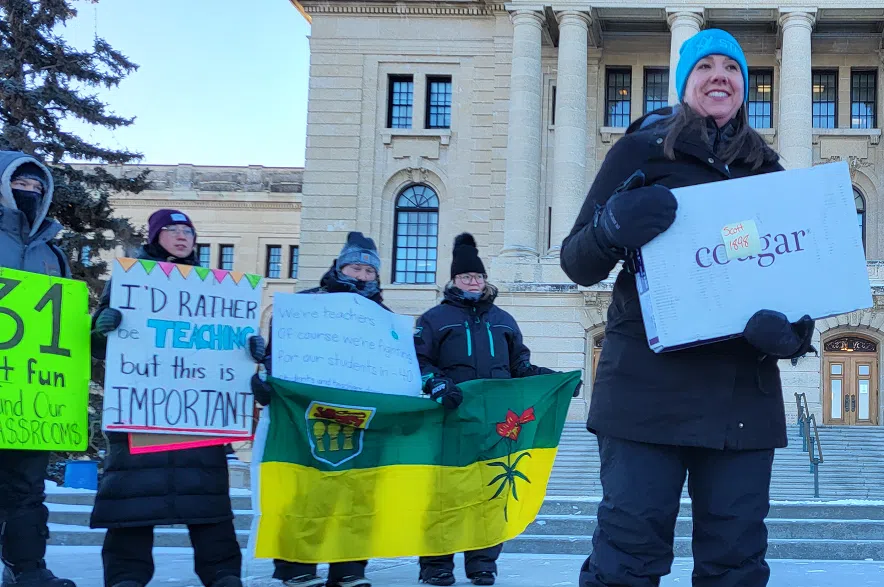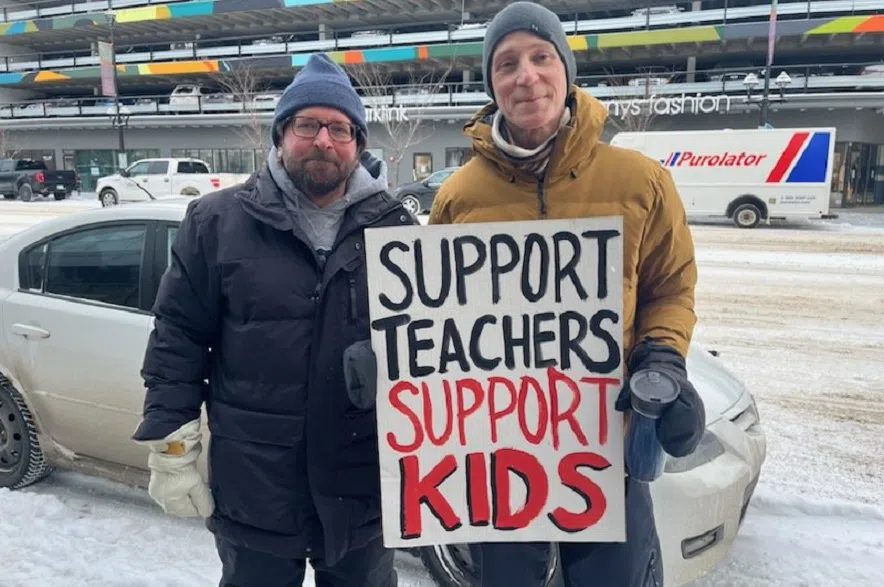Around and around the Government of Saskatchewan and the province’s teachers continue to go.
On Thursday, many of Saskatchewan’s teachers will take to the picket lines for a rotating strike, which follows a pair of single-day strikes held by teachers across the province earlier this month.
Samantha Becotte, president of the Saskatchewan Teachers’ Federation (STF), said the union hoped to negotiate a contract from the beginning, but prepared both long- and short-term strategies as well.
She said the shift from the one-day strikes to the rotating strike format doesn’t change how teachers are feeling about the standstill negotiations.
Becotte told Evan Bray on Wednesday that she has had a couple of conversations with Jeremy Cockrill, Saskatchewan’s minister of education, over the past month, and said the union’s bargaining committee has also been in contact with the government.
The union president called it frustrating that the province has not moved from its opening position.
“Teachers aren’t going to negotiate against ourselves,” she told Bray. “That’s not a negotiation. That’s not what we expect within our teachers negotiation here in Saskatchewan. That’s not how it should be.”

Samantha Becotte, president of the Saskatchewan Teachers’ Federation, joins teachers for a demonstration in front of the Legislative Building in Regina during a single-day teacher strike on Jan. 16, 2024. (Daniel Reech/980 CJME)
Becotte said she expects the negotiations to eventually end up somewhere in between the initial proposals that were shared at the bargaining table in May and June of 2023.
“These are our opening proposals. We didn’t put them up on billboards and say that that’s the only offer,” she said, referring to an advertising campaign by the province.
In terms of salary, teachers in Saskatchewan are seeking an annual increase of two per cent – plus the Consumer Price Index average annual rate – for four years.
Cockrill has said that would add up to a 23.5 per cent increase over the four-year period. The government countered with an offer of a seven-per-cent raise over three years.
The pay increase the STF is seeking, Becotte said, came from nearly 18 months of “thorough consultation” that consisted of regular surveys, meetings with teachers, town halls throughout the province, online meetings, and more.
“It took a lot of time to make sure that we had the proposals right – that we were accurately representing what teachers were experiencing and what they needed to see in a collective agreement going forward,” Becotte said.
Becotte said the data collected by the union pointed repeatedly to salary and classroom complexity being the key issues of concern for teachers in the province.
Bray asked Becotte to respond to Cockrill’s statement that since 2007, education and school operating budgets have increased by 47 per cent in Saskatchewan while enrolment has only increased by 16 per cent.
Becotte said schools today are facing much greater costs, including operational expenses, taxes and bills like heat and electricity. She said classrooms are also seeing more students with needs that require additional resources or staff beyond what was seen in 2007.
The union head said she is open to a memorandum of understanding or another form of agreement within the negotiations that ensures future action by the government on the issues teachers are concerned about.
“But we need to have a mechanism that is included within there that ensures accountability for all sides,” she said.
Becotte added that some sort of consultation or recording mechanisms is needed to ensure teachers’ voices will be included in decisions about the future allocation of resources. As the ones working directly with kids and understanding their needs, Becotte said teachers’ input will help ensure the right areas are receiving the additional help they need.
When asked what the province has done well in terms of education, Becotte was reluctant but said the Government of Saskatchewan has done well in responding to pressure – though she added that the government hasn’t acted in ways that show long-term commitment.
“We need these one-time funds to be put into the budget. We need them to be predictable and sustainable, because school divisions can’t hire additional supports when you are providing one-time funds,” she told Bray.
Becotte said she wants to know how long the government plans to leave teachers without a contract.
“We cannot go on any longer,” she said. “We need to see a change. We need to see a real investment in our kids and in the future of Saskatchewan.”











